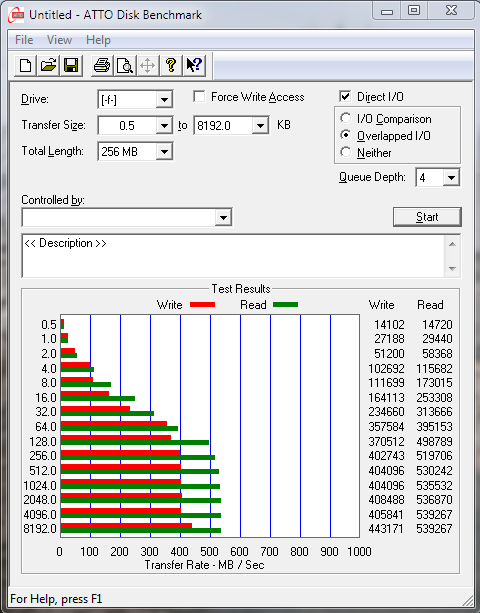ATTO Disk Benchmark is perhaps one of the oldest benchmarks going and is definitely the main staple for manufacturer performance specifications. ATTO uses RAW or compressible data and, for our benchmarks, we use a set length of 256mb and test both the read and write performance of various transfer sizes ranging from 0.5 to 8192kb. Manufacturers prefer this method of testing as it deals with raw (compressible) data rather than random (includes incompressible data) which, although more realistic, results in lower performance results.
Initial ATTO results of 539MB/s read and 443MB/s write confirm listed specifications when testing with compressible data.
CRYSTAL DISK BENCHMARK VER. 3.0 X64
Crystal Disk Benchmark is used to measure read and write performance through sampling of highly compressible data (oFill/1Fill), or random data which is, for the most part, incompressible. We have provided the results of testing in highly compressible data on the left and that of highly incompressible data on the right.
Not having reviewed an SSD with asynchronous memory in awhile, the result on the right brought us back to reality. For the most part, the results while testing with compressible data, as we might see in video, music and photographs, were expected as was the result on the right while testing with incompressible data. Asynchronous memory is more value minded than premium synchronous memory and thats the trade off to keeping the Atlas 480GB SSD at an affordable price point.
Similarly, in large LSI SandForce driven SSDs, we had observed some time ago that the low 4k random aligned write performance was lower in 480GB SSDs. To be sure, we checked the limited other reviews to include the Intel 480GB, SanDisk Extreme 480GB, OCZ Vertex 3 480GB and other Atlas 480GB reviews and all indicate this to be a pattern. We have approached LSI SandForce and hope to have follow up on this observation soon enough.
Up until recently, AS SSD was the only benchmark created specifically for SSD testing and it uses incompressible data. AS SSD, for the most part, gives us the ‘worst case scenario’ in SSD transfer speeds because of its use of incompressible data and many enthusiasts like to AS SSD for their needs. Transfer speeds are displayed on the left with IOPS results on the right.

 We can once again clearly identify that asynchronous memory is being utilized, however, we had to wonder if this had previously been used as a review sample and might affect things as well.
We can once again clearly identify that asynchronous memory is being utilized, however, we had to wonder if this had previously been used as a review sample and might affect things as well.
AS SSD Copy Benchmark is a ‘true to life’ indicator of what kind of transfer speeds to expect from the Mushkin Atlas 480GB SSD. It simply creates an ISO, Program and Game and moves each from one place on the SSD to another, recording the maximum transfer speed and time it takes to move each file. These are good results however, we typically see speeds of 3-400MB/s and transfer times of 2-4 seconds with today’s newer SSDs.
 The SSD Review The Worlds Dedicated SSD Education and Review Resource |
The SSD Review The Worlds Dedicated SSD Education and Review Resource | 

OMG,what were they thinking….cheap asynchronous NAND flash memory….yikes
3 year warranty is a no-go on a $400 plus part.
still better than TLC flash..
with 128gbit die flash, this will be in the future possbile without the additional 4 flash chios
usually I am very pleased with your tests… in this case – well got me a little confused not to compare this drive to sandisk xtreme 480GB (priced at 328,-€ -> 435$), thinking it would best the atlas (this comment should be deemed non existent if you’d mean best msata 480GB drive)
Mine lasted less than 6 weeks. Completely crashed and can’t do anything with it. I would not recommend this to anyone.
So it looks like the new crucial 480gb mSata is pretty much the same drive?
I don’t quite understand.
Beaten to a pulp by Crucials 480GB mSATA SSD